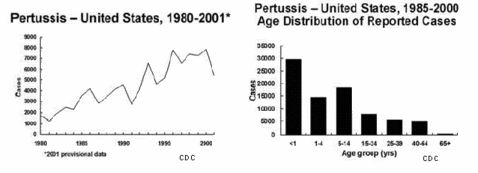Doctors recommend hepatitis shot for kids
Hepatitis A is a virus that causes (obviously) hepatitis, as well as jaundice, fatigue, nausea, fever, loss of appetite, and diarrhea. It's often spread fecal-orally; that is, you put something in your mouth that has fecal contamination. (Just makes you want to run to the bathroom and brush your teeth, doesn't it?) It also can be spread via sexual contact and shared needles (or other contact with blood or body fluids). It's estimated that there are ~40,000 acute cases of Hep A per year, with many of them going undiagnosed. It's one of those diseases that you don't hear about until there's an outbreak (like this one), but it causes a significant amount of morbidity in the U.S. every year. Hence, the new recommendations:
The Advisory Committee on Immunization Practices, which helps set federal vaccination guidelines, voted unanimously to recommend that a two-dose vaccination be given young children. The panel's recommendations are routinely adopted by federal health officials and are influential to doctors.
Expanding the vaccination recommendation to all the states could prevent 100,000 cases and 20 deaths in the lifetimes of children vaccinated in one year. The direct costs of the vaccine program, currently at $22 million, would increase to $134 million.
Also new is the recommendation to add pertussis to the tetanus-diptheria booster shot for adults. Bordatella pertussis is the cause of whooping cough, a rare disease now but one that caused a lot of misery (and a lot of mortality) in the pre-vaccine years. Children are still vaccinated against it, but there are 2 problems: 1) insufficient vaccine coverage, as parents refuse to have their children vaccinated due to religious objections or fear of side effects, and 2) infection of infants before the vaccination has elicited immunity. The bad thing about pertussis is that the vaccine wears off after 5 years or so, meaning that adults have little or no immunity. This isn't a big deal for we "grown-ups," as pertussis doesn't cause such serious disease in adults. What it's a problem for are adults who are around incompletely vaccinated infants or children: if the adult is a carrier, they can pass the bacterium to a child, causing illness in the recipient. And there has been a resurgence of pertussis in recent years:

Since pregnant women are one group that will be in contact with both unvaccinated infants and waaaay too much fecal material, they're an ideal target for both of these vaccines. I've already passed along the recommendations to my expectant sister so that she can discuss it with her M.D.
